Discover 8 top AI search engines, both free and paid, offering advanced features and continuous learning improvements for a refined search experience.
AI search engines are a new type of search engine that uses artificial intelligence technology to improve its search capabilities and performance.
These search engines use advanced algorithms, natural language processing (NLP), machine learning, and other AI approaches to comprehend user queries, evaluate context, and produce intelligent search results.
Benefits of AI search engines
AI search engines offer several advantages over traditional search engines. Some of these advantages include:
- Better understanding of natural language: AI search engines can understand natural language queries and content better than regular search engines. They consider the context and actual meaning behind the question, rather than just words and phrases.
- Advanced features: AI search engines can cover advanced features like image search or voice search, providing users with more options and flexibility in their search experience.
- Continuous learning and improvement: AI search engines can learn from past interactions and improve over time through machine learning. They analyze user interactions, feedback, and relevance judgments to refine their understanding of queries and optimize relevance ranking algorithms .
- Search engine optimization improvements: AI search engines can help with summarizing content, building better page titles, suggesting topics, rephrasing sentences, or cutting text to the desired length without losing its meaning.
- Increasing brand promotion and reputation: Your content might be cited and presented with a link to the source. That makes your brand not only visible but also helps build your reputation.
- Code examples: They give some code examples. Not ideal, but might be a good hint. However, check if the provided code is relatively modern, as some examples may refer to quite old techniques or use code that’s been replaced by new solutions.
Not everything that shines is gold. Understanding AI search engines.
While AI search engines can provide quick and efficient results, it’s important to remember that they are not infallible. They rely on algorithms and data provided to them and may make mistakes or have biases in the information presented. It’s always a good idea to cross-check information with other trusted sources.
Here are some things worth knowing:
- AI language models, while good at predicting the next word in a sentence, often lack understanding of the sentence’s meaning, making them unreliable for search engines.
- Many AI-based search engines have attempted to improve the accuracy of their AI-generated search summaries by offering citations, but this does not address the issue of AI models generating falsehoods.
- AI can help discover positioning opportunities and optimize content with new keywords, but it may produce plagiarized content and inconsistencies.
- AI-generated content may not be original, lack quality control, have missing images or media content, or be up-to-date.
You may also be interested in reading the article called “AI-powered” is tech’s meaningless equivalent of “all natural”.
Each search engine has advantages and disadvantages. Each search engine has advantages and disadvantages. Let’s explore eight top AI search engines, free and paid.
Perplexity
- Sign up required: No
- Usage: free and paid with enhanced features
Perplexity AI is an AI platform that focuses on information discovery and sharing. It serves as a tool to empower users in various ways, such as summarizing content, exploring new topics, and fostering creativity.
The platform is described as an AI-powered Swiss Army Knife for enhancing knowledge and curiosity. Additionally, Perplexity AI has been reviewed for its advantages and functionalities, highlighting its role in unlocking the power of knowledge.
The answers to the question are quite interesting and often written in good language.
Perplexity AI search is free to use. The platform offers a free version with limited features and a paid plan that provides access to all features.
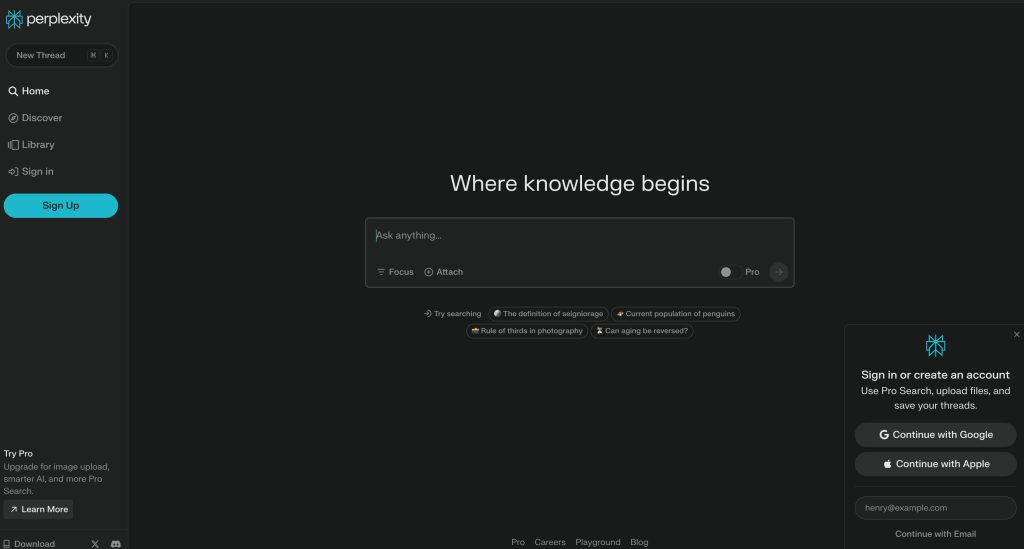
Phind
- Sign up required: Yes
- Usage: free and paid with enhanced features
Phind is an AI-driven search engine optimized for developers and technical questions. It leverages large AI language models to generate answers based on information from the internet, using multiple sources to determine useful information and even extracting code snippets to assist users. The search engine is specifically tailored for developers, offering precise code search, context-aware results, and efficient documentation parsing, making it ideal for navigating vast repositories, documentation, and solving coding challenges.
Phind AI stands out for its developer-centric focus, providing more context-driven search results compared to more general search engines. It’s designed to understand the semantics of coding, making it a valuable tool for developers seeking an efficient way to navigate code and documentation.
Phind AI is built on a combination of state-of-the-art machine learning models and sophisticated algorithms, focusing on the intricacies of programming languages, developer jargon, and technical documentation. The platform is backed by a passionate team of developers, AI enthusiasts, and tech visionaries, with support from prominent tech incubators and organizations like Y Combinator.
Phind AI offers a free tier and various pricing tiers for different user needs, making it accessible to a wide range of developers.
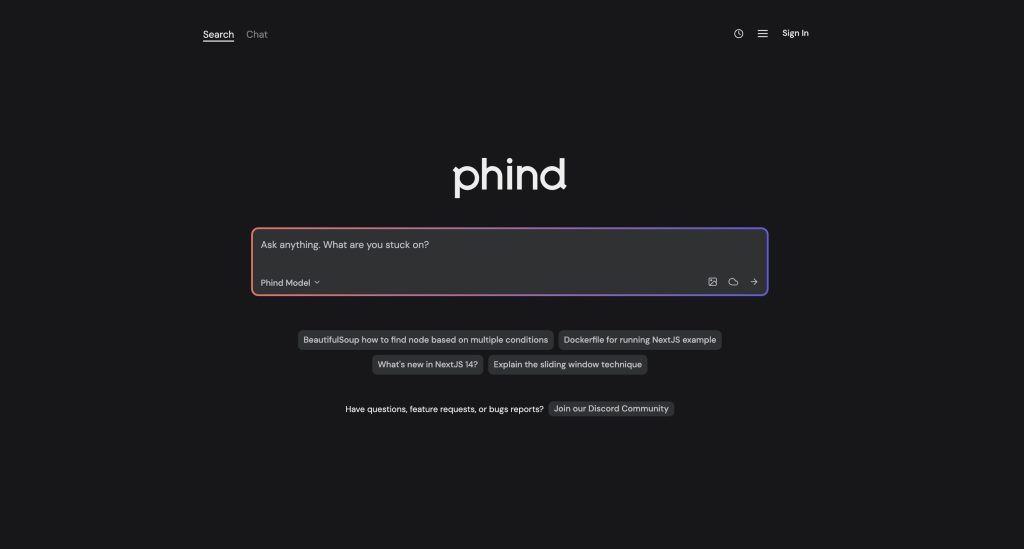
You.com
- Sign up required: No
- Usage: free and paid with enhanced features
You.com is a search engine that aims to prioritize user control and privacy while providing a range of features and services. It combines search results, apps, and shortcuts to present information in rows that form an interface of your digital life.
You.com offers a personalized AI assistant called YouChat, which enhances web search, writing, coding, digital art creation, and problem-solving. It also provides a writing tool called YouWrite, powered by OpenAI The search engine emphasizes user privacy and claims it will never sell user data.
Users can use the search engine as-is, customize their experience, or utilize its Private Mode, where searches, preferences, and locations are not stored. You.com integrates AI technology to deliver a richer search experience and offers plugins for Microsoft Edge and Google to use You.com as the default search engine.
The search engine was backed by Salesforce founder Marc Benioff and launched in 2020 with the goal of providing an alternative to existing search engines, focusing on AI and user needs.
The free version of You.com offers a private, ad-free search engine service that is available for anyone to use without any cost. In contrast, the paid version, known as YouPro, offers additional features such as a generative AI search chatbot and more advanced capabilities for a monthly subscription fee.
The main differences between free and paid versions of services like You.com typically include enhanced security features, additional support options, and sometimes exclusive functionalities that are not available in the free version.
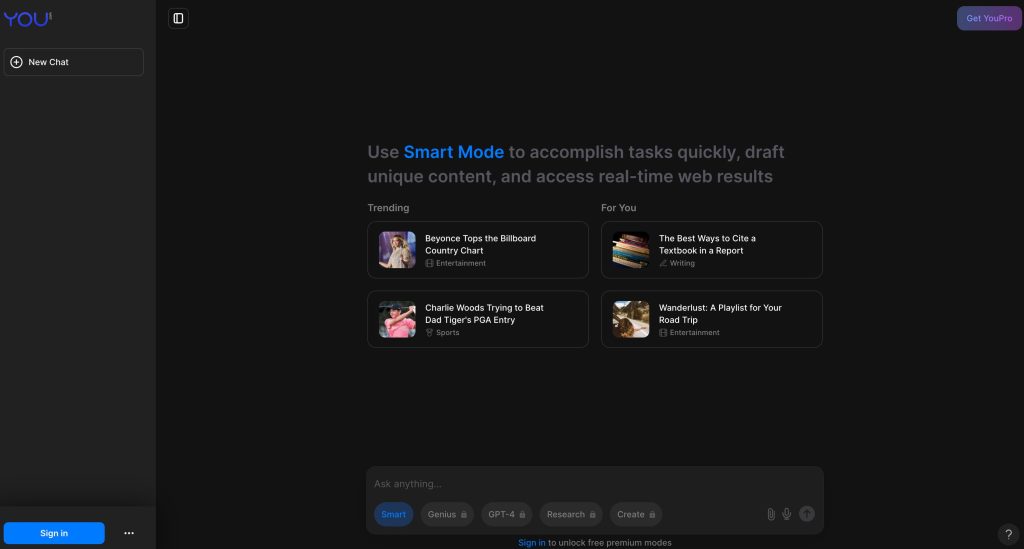
Komo
- Sign up required: No
- Usage: free and paid with enhanced features
Komo.ai is a free, advanced search platform that employs artificial intelligence to offer users a seamless and intuitive search experience. It stands out from traditional search engines by leveraging generative AI, which allows it to present search results in a manner that caters more directly to the user’s needs.
Unlike some other search engines that display a list of links, Komo.ai uses generative AI to create content based on the user’s queries and interests, potentially providing a more relevant and engaging search experience.
Komo.ai is committed to providing a private and fast search experience, ensuring that user searches are conducted efficiently without the distractions of advertisements.
The platform’s design emphasizes ease of use, allowing users to explore various topics, brainstorm ideas, and engage in conversations with the AI.
Beyond just search, Komo.ai offers several AI use cases, such as chat, explore, and search, each designed to enhance the overall search journey for the user.
Users can see what the community is talking about and participate in discussions, making Komo.ai not only a tool but also a community hub.
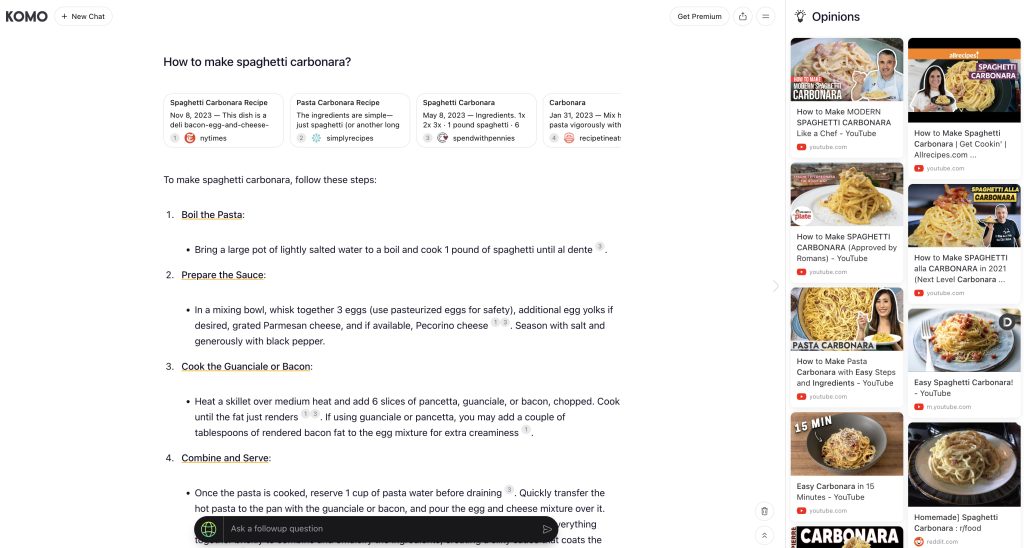
Brave Leo AI
- Sign up required: No
- Usage: free and paid with enhanced features
Brave Leo AI is an AI assistant integrated into the Brave browser, offering users the ability to ask questions, get answers, and interact with web content while maintaining privacy and security.
Leo can summarize webpages, answer questions, create content, translate languages, transcribe audio and video, and engage in conversations.
Leo is available on desktop (macOS, Windows, and Linux) and on mobile (Android and iOS).
The Brave browser shares minimal data with the servers powering Leo, including the latest query and conversation context, ensuring privacy by discarding all chat records once closed.
Users do not need to create an account to use the free version of Brave Leo, but there is a limit of responses. Premium account is required for Leo Premium access.
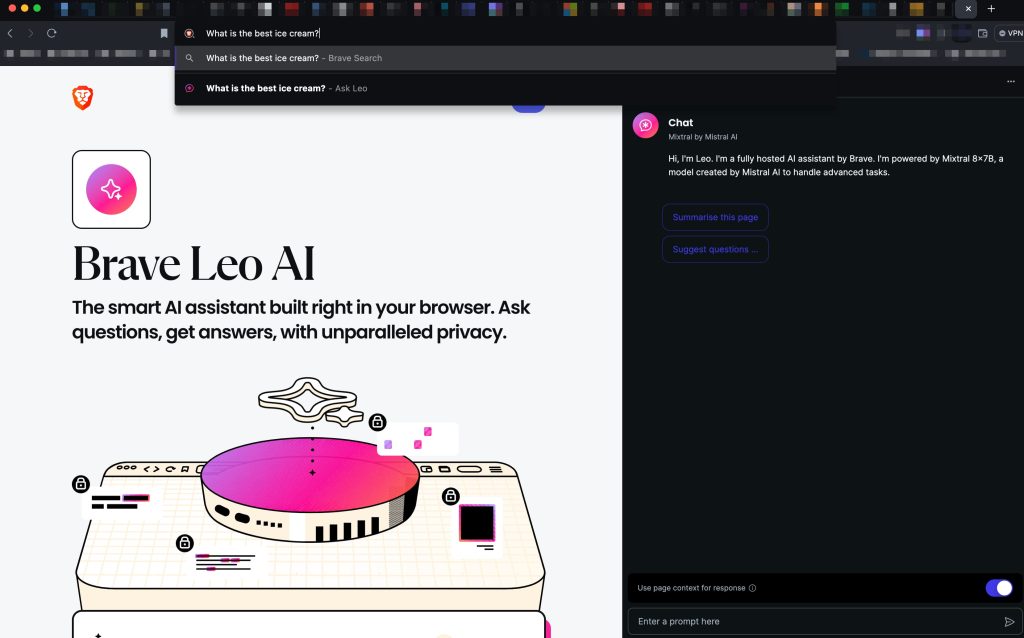
Kagi
- Sign up required: Yes
- Usage: free and paid with enhanced features
Kagi is a premium search engine that offers a clutter-free search experience, free of ads and tracking. It aims to provide high-quality search results without biases or agendas, favoring the best information for users. Kagi operates on a paid model, supported solely by its users, to ensure sustainability and maintain its commitment to user privacy and quality results.
Founded in 2018 by Vladimir Prelovac in Palo Alto, CA, Kagi Inc. has a mission to humanize the web by amplifying human knowledge, creativity, and self-expression. The company offers products like Kagi Search, a fast private search engine, and Orion Browser (based on WebKit engine), a zero-telemetry browser.
Kagi’s features include customizable search experiences through “lenses” that allow users to tailor their searches based on preferences. Users can mute or prefer websites in their results, change colors, spacing, and control what is displayed. Additionally, Kagi offers exclusive access to FastGPT and Universal Summarizer tools.
The pricing model for Kagi includes a free tier with limitations on the number of 100 searches, but after that, you can choose to subscribe to a paid plan. While Kagi requires users to create an account for billing purposes, it emphasizes privacy by not saving search history and offering options like anonymous email registration and Bitcoin payments.
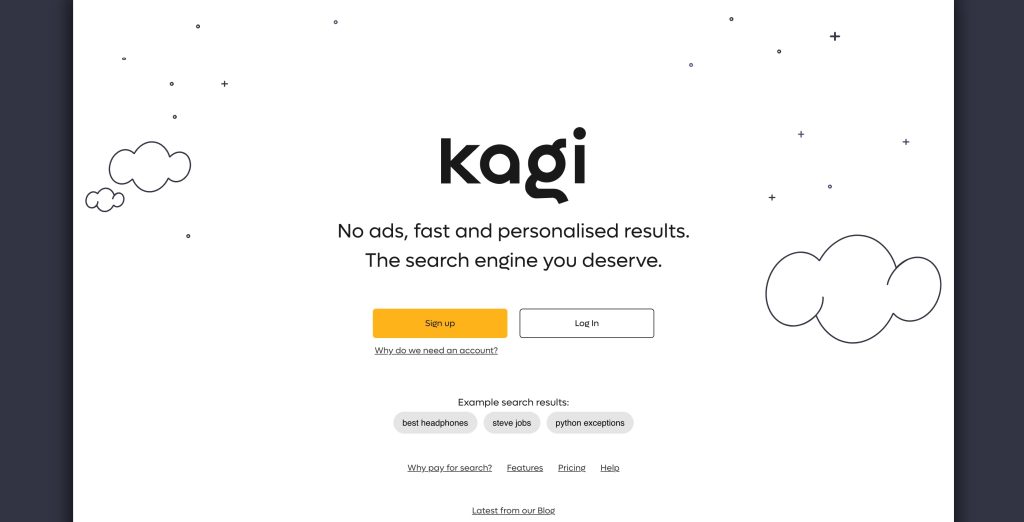
Bing Copilot
- Sign up required: No
- Usage: free (limited to a few queries) and paid with enhanced features
Bing Copilot, previously known as Bing Chat, an AI-powered and free to use chatbot feature integrated into the Bing search engine, allowing users to search for information and generate content such as reports, images, outlines, and poems based on information gleaned from the internet and Microsoft’s database of Bing search results. It utilizes AI and Large Language Models (LLM) technology to understand complex and natural language queries. Access to Copilot in Bing is available through the Bing search engine, Microsoft Edge web browser, and can be added to other web browsers and mobile devices via addons and downloadable apps.
Copilot in Bing offers three conversation styles: Creative, Precise, and Balanced, allowing users to choose the type of output they desire. Creative mode provides original and imaginative results, including jokes, stories, poems, or images. Precise mode delivers factual and concise answers, while Balanced mode aims to strike a balance between accuracy and creativity. Users can switch between these modes during a session.
Copilot in Bing is designed to chat with text, voice, and image capabilities, summarize documents and web pages, create images in Designer (formerly Bing Image Creator), and use plugins and Copilot GPTs. For work, when enabled, it includes commercial data protection for eligible Microsoft Entra ID users at no additional cost. Copilot Pro, an enhanced version, offers priority model access in peak times, faster image creation with up to 100 boosts in Designer, and Copilot integration in Word, Excel, PowerPoint, Outlook, and OneNote.
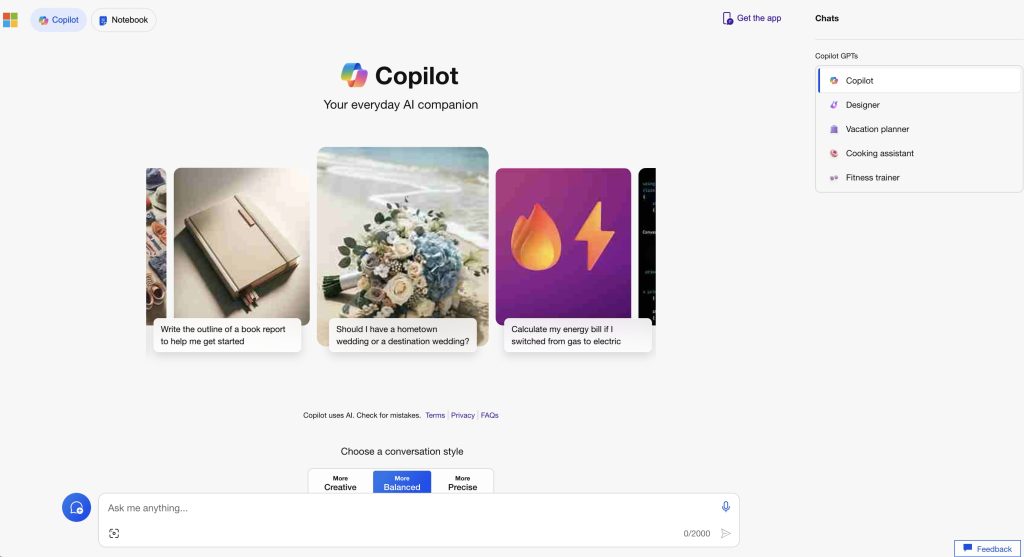
Google Gemini
- Sign up required: No
- Usage: free and paid with enhanced features
Google Gemini is a family of multimodal large language models developed by Google DeepMind, serving as the successor to LaMDA and PaLM 2. It consists of three models: Gemini Ultra, Gemini Pro, and Gemini Nano, which were announced on December 6, 2023, and are positioned as competitors to OpenAI’s GPT-4.
Gemini Ultra is designed for highly complex tasks, Gemini Pro for a wide range of tasks, and Gemini Nano for on-device tasks. The models are capable of understanding and generating text, as well as working with images, audio, videos, and code.
Gemini Pro and Nano were initially integrated into Bard and the Pixel 8 Pro smartphone, respectively, while Gemini Ultra was set to power Bard Advanced and become available to software developers in early 2024. Google also partnered with Samsung to integrate Gemini Nano and Pro into the Galaxy S24 smartphone lineup in January 2024.
Google’s Gemini Advanced is available for free with some limitations as part of the Google One AI Premium Plan, which offers a two-month trial at no cost. Additionally, Google’s Gemini AI in its Gemini Pro version is currently free to use within the Bard chatbot. Therefore, while Google Gemini itself is not entirely free, there are ways to access certain versions or features of it without immediate costs.
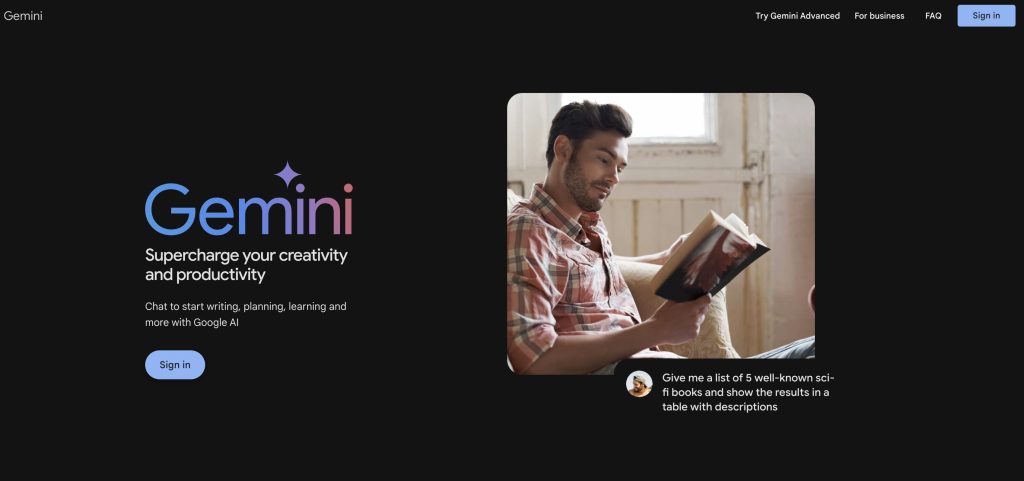
Conclusion
Answers from one search engine may not necessarily be true or up-to-date. It is known that the intention is to provide the best possible answers, but it is also impossible to avoid mistakes. Therefore, it is worth checking answers to the same question in different search engines.

Comments